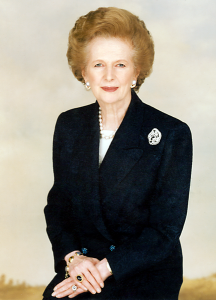Margaret Thatcher – 1985 Statement on European Council in Luxembourg
Below is the text of the statement made by Margaret Thatcher, the then Prime Minister, in the House of Commons on 5 December 1985.
With permission, Mr. Speaker, I shall make a statement about the European Council held in Luxembourg on 2 and 3 December. My right hon. and learned Friend the Secretary of State for Foreign and Commonwealth Affairs accompanied me to this meeting. I have arranged for the conclusions of the Council to be put in the Library of the House.
The European Council reached agreement in five main areas. The first was the completion of the Community’s internal market. This has been an important United Kingdom objective for a long time, with the strong support of British industry and business. The target of completing the Common Market by 1992 will be established in the treaty, and we agreed that there should be greater use of majority voting on a number of treaty articles dealing with goods and services. But unanimity will be retained for all decisions on taxation. The free movement of persons and the rights and interests of employees.
We also retain the right to take national action where required to protect public, animal and plant health.
The United Kingdom’s position and the position of this Parliament are thus properly protected on such vital questions as frontier controls in relation to terrorism, crime, drugs and immigration from outside the Community; and on essential controls in health—for example, on rabies. The Luxembourg compromise, whereby a member state can invoke a very important national interest to prevent a decision being taken, is unaffected.
Secondly, the European Council agreed that the treaty should be brought up to date by new articles on technology, environment and the regional fund. Action has hitherto been taken in these areas on the basis of the general article in the treaty. The new articles will provide a more precise basis for action in these areas in future. Unanimity will be preserved for all-important decisions.
Thirdly, we agreed on procedural changes to improve consultation with the European Assembly. There will be better arrangements to enable the Council to take account of amendments to Community legislation suggested by the Assembly. But in all cases the last word on such legislation will rest with the Council. There will be no transfer of power on these matters from this House to the Assembly.
Fourthly, on monetary co-operation between member states, an amendment to the treaty was agreed which describes what has already been achieved in the Community framework, without entering into new commitments.
Finally, agreement was reached on a separate treaty of co-operation in foreign policy on the basis of the draft presented last summer by the United Kingdom. This formalises existing arrangements for consultation among the Ten on foreign policy matters and looks to a steadily closer co-operation.
The European Council’s decisions on all these matters remain subject to general reservations from Italy and Denmark. The proposed amendments to the treaty will go forward only if these reserves are lifted. The United Kingdom has reserved its position on the voting arrangements in a proposed new treaty article on working conditions. We insist that unanimity be preserved, in view of the risks that this article might be used to impose unfair burdens on our small and medium-sized business.
The European Council also discussed the economic and social situation and confirmed existing economic policies designed to reduce inflation and encourage sustained growth. On deregulation, the Commission gave an undertaking that in future all new proposals would be accompanied by an assessment of the effects on business and job creation; that the most important existing regulations would be re-examined to simplify them and to reduce the burden on industry; and that there should be a regular procedure for monitoring progress towards this objective. The United Kingdom’s initiative earlier this year has thus been formally adopted.
In my statement in this House following the last European Council in June, I made it clear that we would have been ready then to take the steps necessary to complete the internal market, to improve decision taking, to formalise foreign policy co-operation and to improve procedures for consultation with the European Assembly.
Those objectives are now embodied in the conclusions of the Luxembourg European Council together with some tidying up of the treaty to reflect the Community’s development. The amendments to the treaty have to be approved by each sovereign Parliament and accordingly will be submitted to this House.
I believe that the conclusions on completing the Common Market and reducing the burden of regulations will be of long-term benefit to British firms selling their goods and services in the European Community. Together with the arrangements to reduce the scale of Britain’s budgetary contribution agreed last year, they will be an important step towards enabling this country to realise more fully the benefits of our membership of the European Community.

